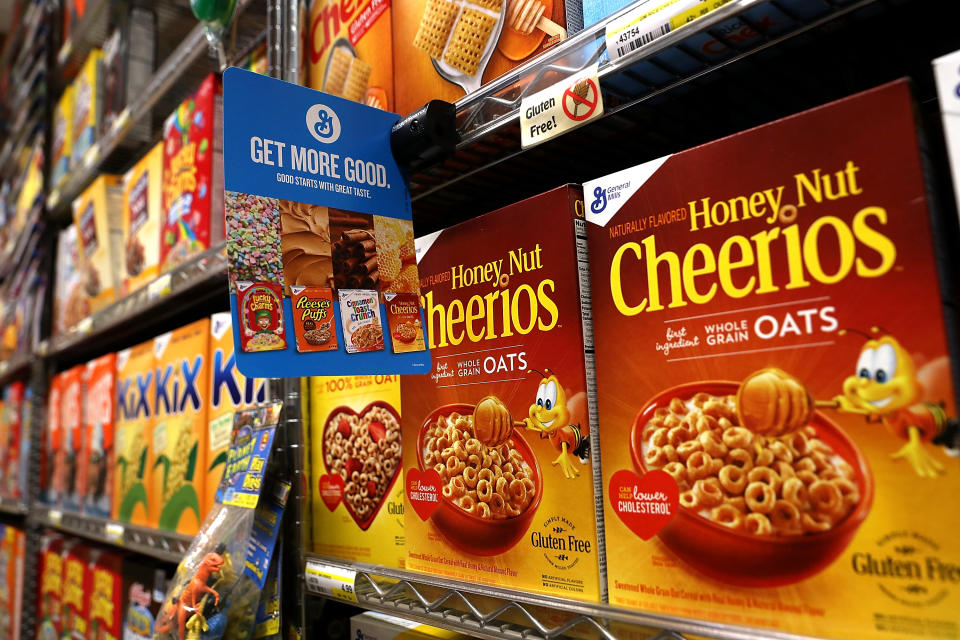Report says certain cereals contain weed killers, Quaker Oats calls the study 'invalid'
Two months after warning consumers that some food products may contain trace amounts of glyphosate, a weed-killing chemical linked to cancer, the Environmental Working Group (EWG) is back with an expanded warning. In a test, EWG took samples of 28 different oat-based cereals and oat-based foods that are meant for kids and found trace amounts of a pesticide that exceed EWG’s thresholds. But, in statements to Yahoo Lifestyle, both Quaker Oats and General Mills vehemently deny the claims, stating that the levels still fall below the threshold of the Environmental Protection Agency (EPA), among other agencies.
So what do you need to know?
Among the brands that EWG confirmed to have higher levels of glyphosate than it deems acceptable were seven types of Cheerios (Honey Nut, Chocolate, Frosted, Oat Crunch, Very Berry, Apple Cinnamon, and Fruity), five types of Quaker Oats oatmeal (both Instant and Overnight), four Quaker Oats breakfast bars, and one type of granola. The products tested were purchased at grocery stores in two cities — San Francisco and Washington, D.C. The test results are available on the organization’s website.
Glyphosate, according to the National Pesticide Information Center, is a weed killer that’s “applied to the leaves of plants to kill both broadleaf plants and grasses.” First introduced in 1974, glyphosate is reportedly the main ingredient in an herbicide made by Monsanto called Roundup — one of the most widely used weed killers in the United States.
The World Health Organization (WHO) released a report in 2015 stating that there was “sufficient evidence” that glyphosate is “probably carcinogenic.” Although the report raised controversy in the science world — with Reuters reporting that the WHO edited out non-cancer-causing findings — there is anecdotal evidence of the cancer-causing properties that the chemical possesses. In August, a man in California won a lawsuit against Monsanto stating that exposure to the weed killer led to his terminal cancer. A jury in San Francisco ruled in favor of the man, forcing the company to pay $289 million in damages.

As a result of the demonstrated danger, EWG is warning consumers to be cautious about purchasing the products listed and is calling on General Mills and the Quaker Oats Company to address the findings. Both companies have routinely stressed that their products are “safe” and “meet regulatory safety levels.” In a statement to Yahoo Lifestyle, General Mills vehemently refuted the report.
“General Mills’ top priority is food safety and has been for over 150 years. Most crops grown in fields use some form of pesticides, and trace amounts are found in the majority of food we all eat. Experts at the FDA and EPA determine the safe levels for food products. These are very strict rules that we follow as do farmers who grow crops,” the company tells Yahoo Lifestyle. “The extremely low levels of pesticide residue cited in recent news reports is a tiny fraction of the amount that the government allows. Consumers are regularly bombarded with alarming headlines but rarely have the time to weigh the information for themselves. We feel this is important context that consumers should be aware of when considering this topic.”
General Mills noted that others have cast doubt on the dangers of the EWG reports on pesticides in the past. In a piece on Slate titled “You Don’t Need to Worry About Roundup in Your Breakfast Cereal,” Susan Matthews argues that the EWG’s report feeds off of “chemophobia” and that the metrics the organization sets unfairly skew the results.
“The EPA threshold, which was set in 1993 (so no Trumpian interference to worry about), is 2 milligrams per kilogram of body weight per day (140 milligrams per day for the average adult). That’s the reference dose that’s considered safe to consume daily throughout a lifetime,” Matthews writes. “None of the foods tested by EWG passes that threshold — they don’t even come close.”
In another statement to Yahoo Lifestyle, Quaker Oats provided more support for the idea that these foods are safe — and that the EWG report is overblown. “The EWG report artificially creates a ‘safe level’ for glyphosate that is detached from those that have been established by responsible regulatory bodies in an effort to grab headlines and has the potential to falsely alarm consumers, leading them to avoid consumption of many oat-based foods that are proven to be beneficial for the human diet,” Quaker tells Yahoo Lifestyle. “We believe EWG’s approach is invalid, and we stand behind our statement that the Quaker products tested by EWG are safe. Producing healthy, wholesome food is Quaker’s number one priority, and we’ve been doing that for more than 140 years.”
Despite that — and other articles — raising suspicion about the EWG’s process, the organization is doubling down on its claims. “How many bowls of cereal and oatmeal have American kids eaten that came with a dose of weed killer? That’s a question only General Mills, PepsiCo, and other food companies can answer,” EWG president Ken Cook said in a statement. “But if those companies would just switch to oats that aren’t sprayed with glyphosate, parents wouldn’t have to wonder if their kids’ breakfasts contained a chemical linked to cancer. Glyphosate and other cancer-causing chemicals simply don’t belong in children’s food, period.”
Read more from Yahoo Lifestyle:
‘Is nothing sacred?’ Little Caesars allegedly caught using frozen pizza
Pizza saves another life: Delivery driver rescues woman from alleged attempted kidnapping
Follow us on Instagram, Facebook, and Twitter for nonstop inspiration delivered fresh to your feed, every day.
